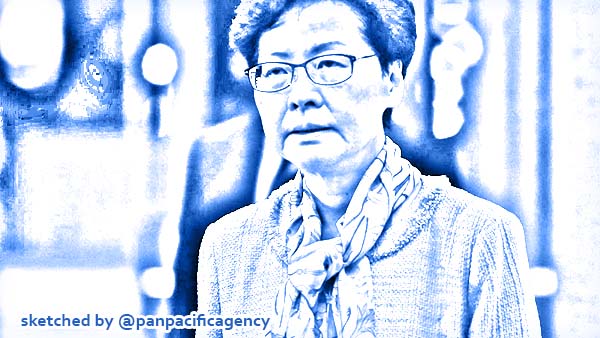Hong Kong leader Carrie Lam to announce formal withdrawal of extradition Bill

Hong Kong leader Carrie Lam has said that a controversial extradition bill, which has spurred weeks of protests in the semi-autonomous Chinese city, "is dead" - but stopped short of a formal withdrawal. (AAP). Sketched by the Pan Pacific Agency.
HONG KONG, Sep 4, 2019, Bloomberg. Hong Kong’s embattled leader, Mrs Carrie Lam, plans to formally withdraw legislation that would have allowed extraditions to China, local media reported, a move that may help ease months of unrest in the Asian financial centre, reported The Straits Times.
Mrs Lam plans to formally withdraw the Bill after a meeting with pro-establishment political figures planned for 4pm on Wednesday (Sept 4), the South China Morning Post newspaper and other media reported, citing people they did not identify. The gathering included local legislators and the city’s representatives to national legislative bodies, said lawmaker Michael Tien.
“We were all notified yesterday,” Mr Tien said. “The rumour is that she wants to withdraw the Bill.”
A spokesman for Mrs Lam’s office was not immediately available to comment by phone or e-mail on Wednesday afternoon.
The meeting follows a weekend of demonstrations that saw some of the fiercest clashes between protesters and riot police. Activists have lobbed petrol bombs and set bonfires in the streets, while police officers fired tear gas, rubber bullets and pepper spray, making more than 1,100 arrests since early June.
Hong Kong stocks jumped, led by property developers, after news reports said Mrs Lam will formally withdraw the extradition Bill that has sparked months of protests. The benchmark Hang Seng Index surged as much as 3.9 per cent before paring gains to 3.4 per cent at 3.06pm local time.
The turmoil that followed Mrs Lam’s attempt to introduce the ill-fated Bill – including mass marches that drew more than 1 million people and protests that shut the city’s busy airport – have turned into the biggest crisis for Beijing’s rule over the former British colony since it returned to Chinese rule in 1997.
Aggressive police tactics, threats by Beijing to deploy troops and sweeping arrests of pro-democracy figures have raised fears about Hong Kong’s autonomy and drawn international condemnation.
Although Mrs Lam had previously suspended the Bill – saying it was “dead” – her move did little to appease demonstrators, who continued protesting and expanded their demands to include calls for greater democratic freedom. Without the Bill’s formal withdrawal, it could be reintroduced in a matter of days.
Still, it was not immediately clear whether the formal withdrawal would end the protests. The action was only one of five main demands, which also include calls for an independent inquiry into police violence, an amnesty for those who have been arrested and universal suffrage.
“Withdrawal of the Bill would be only meeting one of the five demands, and this is not the focus of people today,” Mr Tien said. “People forgot how this whole thing started. It’s about the way the police handled protesters – that is the much more important issue than the stupid Bill.”
CONTROVERSIAL LAW
Opponents had said the Bill threatened the city’s tenuous autonomy from China and undermined its reputation as a global financial centre.
Mrs Lam’s Beijing-backed government had faced growing public concern that China, emboldened by its rising economic power, was less committed to Hong Kong’s colonial-era guarantees of independent courts, free speech and capitalist markets.
On Tuesday (Sept 3), Mrs Lam addressed a Reuters report of a leaked audio recording in which she said she had “very, very, very limited” room to meet the demands of protesters and would quit “if I had the choice”. Speaking to reporters, she said she had “not even contemplated to discuss a resignation with the central people’s government”.
Meanwhile, Chinese officials overseeing Hong Kong softened their tone towards the city’s protesters, saying peaceful demonstrations were allowed under the law, even as it ruled out a fundamental demand for direct democracy that has fueled the unrest. They also reaffirmed support for Mrs Lam and her government.
The extradition Bill was originally proposed by Hong Kong’s government in February and covered mainland China and other jurisdictions that do not have an extradition agreement with Hong Kong.
Mrs Lam and the law’s backers originally defended it as necessary to ensure the city would not become a refuge for suspected fugitives.
Her push to pass it before the end of the legislative period in July was sparked by the case of a local man who was accused of murdering his girlfriend in Taiwan. He was arrested in Hong Kong and convicted of money laundering, but could not be sent back to the island to stand trial as there was no framework to do so.
Another pro-establishment lawmaker, Mr Felix Chung, said that withdrawing the Bill would “certainly” help.
“Whether the impact will be a huge one or not, I’m not sure – would have to wait and see,” Mr Chung said. “At least it’s a very positive move, even if it’s a bit late.”